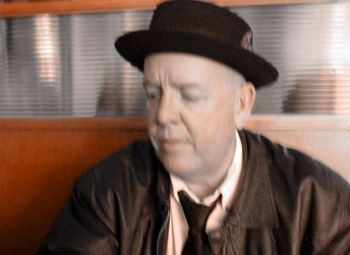
Write a biography about yourself.
Writing assignment? That seems hardly fair, but here goes: my worklife has spanned thirty years in a gray smear of jobs,
none of which could be imputed as glamorous. Mostly I've masqueraded as a timid bureaucrat for the feds, and for the last
ten years or so have been employed in the field of immigration as an adjudications officer, taking testimony, issuing decisions,
administering oaths.
My wife and I call Fresno home. Sharon grew up here, when the town was charming, rural, and harmless as a hayride.
I moved here from SoCal after high school. I liked what I found, stayed, made friends, attended college (BA, MA, goo-goo).
Back in the day, you could still catch a glimpse of William Saroyan awheel on his bicycle.
My daughter, Breanna, makes her home in Nevada.
Brief description of the chapbook.
Think of The Whole Enchilada as an absurdist playground, and you're invited. There you'll find an abundance of whooping, hollering,
cussing and adolescent ridicule. There you'll find a lot of sand being flung around, kicked around. It's a ruckus of mockeries,
a splenetic free-for-all.
The poems: more than a few are found-text pieces, derived from the ephemera and detritus of life, which are combined or
manipulated or both; some are casual narratives; some began as correspondence and later stood trembling on their own.
Describe the room you write in.
There may be many mansions in my father's house, but at my place it's just 3BD/2BA + patio and attached garage.
An anonymous abode in an oblivion of subdivisions. One upstairs bedroom has devolved into a de facto office.
I can loaf sideways and look behind me, past the big window, and see hundreds of books laddered up the wall; opposite those,
several prints by the photographer Garry Seidel; on the credenza, a full-face motorcycle helmet rests on an open dictionary;
above the computer, William Burroughs tilts into the abyss of his Adler typewriter; to the left, snapshots of family and friends;
next to those, from Easy Rider, a poster of Dennis Hopper flashing the finger just before he's blown into two decades of cinematic
obscurity; other photos, Mohammed Ali on the Great Wall of China, and Wallace Stevens, the Salmi portrait; on another wall,
R Crumb's "Short History of America"; three prints by Nelson De La Nuez ("Look Busy, Jesus is Coming," "The Last Happy Meal,"
"Disappointed Barbie"); a couple of framed collages. Ah-stuff, stuff. And before me, a cup of yesterday's coffee.
A second workspace perhaps more important is the nondescript 4th floor office I occupy in the federal building downtown,
where lunch hours are often crowded by tedium and ripe for idling one's thoughts across an available keyboard.
Where do you find your inspiration for writing?
The mundane. That's where the action is, baby.
What writers make you tick?
The novels of Cormac McCarthy have over time visited numerous ticks and spasms upon me, particularly Blood Meridian,
The Outer Dark and No Country for Old Men. McCarthy's prose glides like an ornate, hallucinated zeppelin, motoring
along the sun-blinded heights, above the surreal mesas. Masterful work, wildly deserving of the accolades bestowed.
Must confess I've tussled also with the short story form, and am enamored of the short fiction of Yates, Carver, Ford,
Wolff, others. And as to a few of the larger shadows, I suppose, dwelling in the low-rent mini-storage of memory, well,
I'm a bit old school there: Borges, Beckett, Kerouac, HST, Bukowski (mea culpa); these, companioned by Dostoyevsky
(particularly Notes from Underground), Didion, Hurston; must include Laurie Anderson in the pantheon as well. For years
I carried around a billowing, half-destroyed copy of Wallace Stevens' Collected Poems, and would spend long hours trying
to figure out what the hell he was up to in poems like "Bantams in the Pine Woods," all the while marveling drop-jawed at
the Large Red Man's astonishing command of metaphor. Mornings Like This by Annie Dillard put me once more onto found text
as poetry-these endeavors, following some earlier efforts, some published, most abandoned, which had been occasioned by an
admiration for Burroughs' cut-up experiments in The Ticket That Exploded and the trilogy.
Who are you reading now?
At the moment I'm settling into Richard Ford's first novel, A Piece of My Heart, arriving at this title after drifting
backward through his work. I've recently spent some quality time with Juliana Spahr's This Connection of Everyone with Lungs.
Such a lovely Wow of a book. A real knockout. I'm impressed by her previous volumes, also: Testimony, Spiderwasp, Aloha.
And lately John Brehm's The Way Water Moves, Brian Turner's Here, Bullet, and Albert Goldbarth's Budget Travel Through Space
and Time have fallen into my hands, giving me much pleasure.
How do you balance work and writing?
What's the problem? As a friend observed, you just have to focus on what's important.
What is the weirdest thing you've done to find writing material?
I am an officer of the court. Weirdness in all of its manifestations is actively discouraged
(see "Associations of a Questionable Nature"). Mainly, I just sit and watch. And listen. And write.
How long have you been working on The Whole Enchilada?
Five years, six. Not exclusively, of course. The Whole Enchilada was writing itself all along, only I didn't know it at the time.

|

